 Petzlover
Petzlover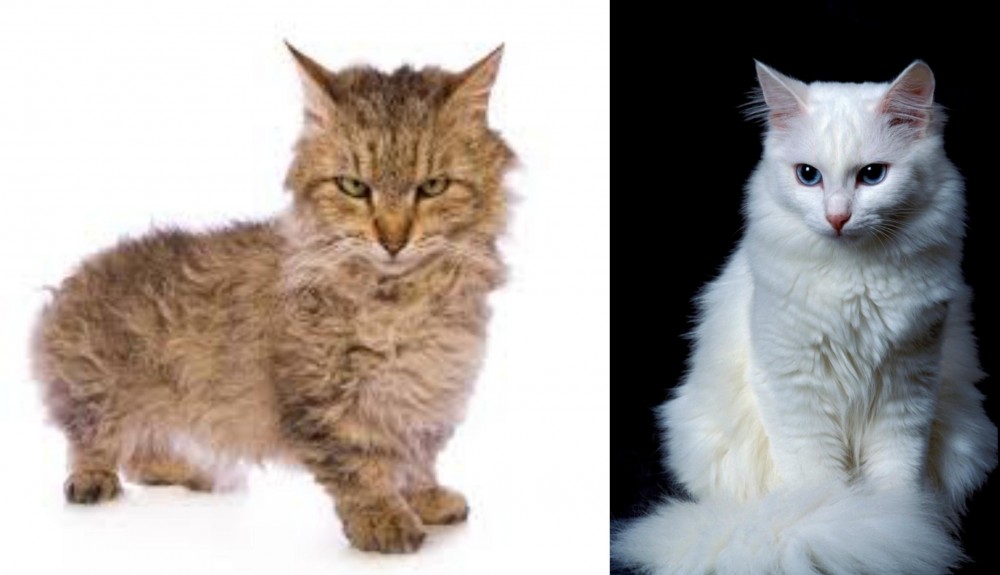 Skookum is originated from United States but Turkish Angora is originated from Turkey. Both Skookum and Turkish Angora are having almost same weight. Skookum may live 3 years less than Turkish Angora. Both Skookum and Turkish Angora has almost same litter size. Skookum requires Low Maintenance. But Turkish Angora requires Moderate Maintenance
Skookum is originated from United States but Turkish Angora is originated from Turkey. Both Skookum and Turkish Angora are having almost same weight. Skookum may live 3 years less than Turkish Angora. Both Skookum and Turkish Angora has almost same litter size. Skookum requires Low Maintenance. But Turkish Angora requires Moderate Maintenance
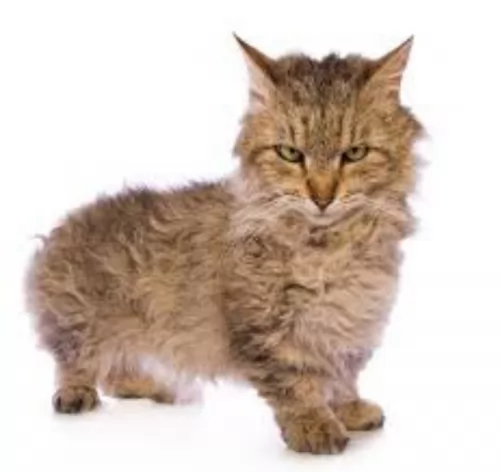 Skookums are a new cat breed – an experimental and rare hybrid dwarf cat breed, It was developed in the United States in the 1990s.
Skookums are a new cat breed – an experimental and rare hybrid dwarf cat breed, It was developed in the United States in the 1990s.
As a new breed, you’re not going to find too much information on their history, but is was breeder Roy Galusha who started crossing the Munchkin cat with the LaPerm.
Even today, some years later, the Skookum cat is still an experimental cat breed that is considered a rare dwarf breed. It is recognized as an Experimental breed by Independent European Registries as well as the Dwarf Cat Association.
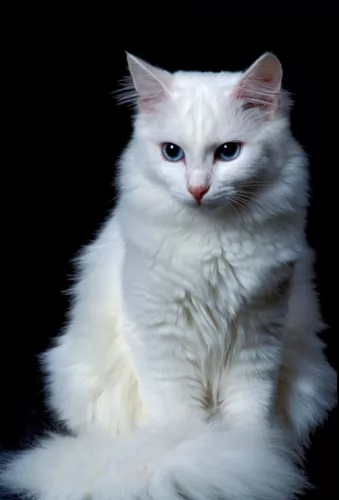 The Turkish Angora is a very old breed that naturally developed. It is thought that the breed developed in Turkey in the Ankara region formerly known as Angora.
The Turkish Angora is a very old breed that naturally developed. It is thought that the breed developed in Turkey in the Ankara region formerly known as Angora.
There are records that indicate that the Turkish Angora made an appearance in the UK as early as the 14th century already. Also, the beautiful longhaired cat was also introduced to the United States.
A breeding program was started for these cats in the early 20th century and it was then taken to Canada in 1963 and accepted as a championship breed.
While white was the only acceptable color at first, they now come in many different colors.
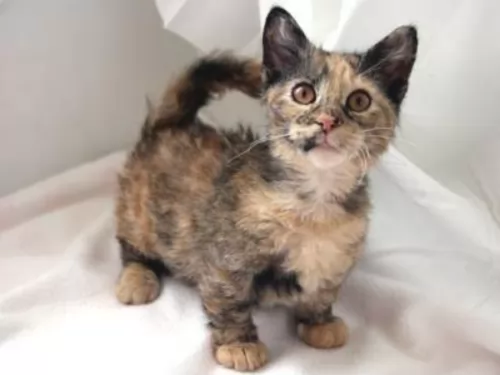 The dwarf Skookum only weighs between 2 and 3kg. It is a new cat breed with a curly coat. The coat can be in a range of colors and patterns.
The dwarf Skookum only weighs between 2 and 3kg. It is a new cat breed with a curly coat. The coat can be in a range of colors and patterns.
It is a small, lightweight cat with short legs and a broad head and stocky build. It has a muscular build. The eyes are large and walnut- shaped while the ears are large and pointed.
The neck is also thickish. The coat is soft and curly, standing away from the body and spiraling into ringlets. It can feature a number of colors and patterns such as solid, bicolor, and colorpoint. These cats can be long-haired or short-haired.
They are playful cats, full of energy and they love climbing and jumping. They’re intelligent, confident cats and are also loyal and loving towards their human family. They may be active, playful cats, but they still like to settle down into your lap.
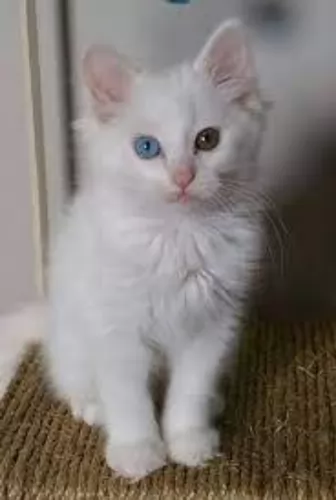 This is a medium-sized, muscular cat that can weigh between 3 and 6kg. It is a long-haired cat and the single coat has no undercoat.
This is a medium-sized, muscular cat that can weigh between 3 and 6kg. It is a long-haired cat and the single coat has no undercoat.
While the Turkish Angora is essentially white, its coat can come in a number of other colors.
The cat’s body if firm and fairly long, the legs are long with the hind legs being longer than the front legs, The tail is long and plumed, the head has large fairly pointed ears that can have tufts of fur. The eyes are large and almond-shaped and slant somewhat upwards. The color of the eyes can be blue, green, gold, amber.
This is a very active, athletic cat and he likes nothing more than to leap up on to high perches to survey his surroundings. They are intelligent, affectionate cats and they seem to gravitate towards one special human family member.
The cat is also protective of his human family. If any family member wants to stroke and pet them, they are absolutely delighted, just lapping up the attention.
They are smart enough to learn a few tricks too. They aren’t vocal cats but are sweet and quiet as well as being affectionate, making them perfect companions.
They don’t do well with changes, and a sudden change in his lifestyle can be upsetting for him.
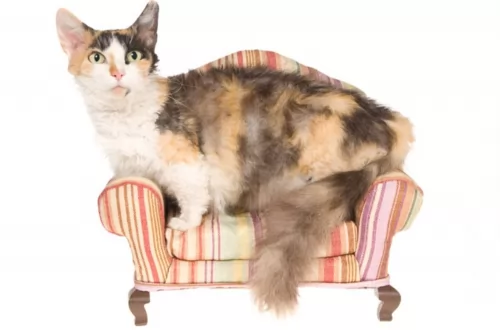 Because the Skookum cat is still in its early stages of development if you want to know precisely what the characteristics of the cat are you would want to look at the Munchkin and the LaPerm cat.
Because the Skookum cat is still in its early stages of development if you want to know precisely what the characteristics of the cat are you would want to look at the Munchkin and the LaPerm cat.
One thing is sure the Skookum cat thrives on the attention of his human family and if you provide him with the love and attention he craves, you can be sure that he will turn out to be the right friend and companion for your family.
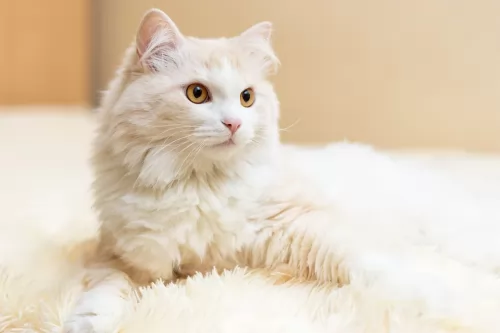 Beautiful to look at, this cat has got all the characteristics that make him a wonderful pet. He is playful well into adulthood and will love an assortment of stimulating toys to be amused by.
Beautiful to look at, this cat has got all the characteristics that make him a wonderful pet. He is playful well into adulthood and will love an assortment of stimulating toys to be amused by.
He is a sociable breed and doesn’t enjoy being left alone for hours. It would be far better to have another feline friend to keep him company.
Active and entertaining, you’ll be amused by your Turkish Angora and be so glad that you made the decision to bring such a charming creature into your home and heart.
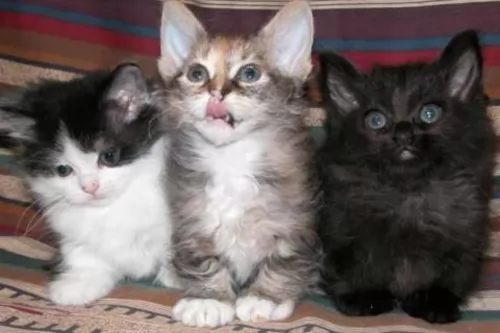 Because the Skookum cat is a new, experimental breed, health problems with the cat are not well known. However, every cat can succumb to some of the common cat health issues there are. As a pet owner you want to watch for and recognize signs that your cat’s health is in trouble.
Because the Skookum cat is a new, experimental breed, health problems with the cat are not well known. However, every cat can succumb to some of the common cat health issues there are. As a pet owner you want to watch for and recognize signs that your cat’s health is in trouble.
Feline leukemia for instance is a disease that spreads through bodily fluids such as urine, saliva and nose discharge, and saliva. Mother cats can even pass the disease along to her kittens. Feline leukemia can also lead to a host of conditions such as diarrhea, respiratory tract infections, skin problems and eye diseases among others.
Feline panleukopenia is known to most people as feline distemper and it is a very contagious viral disease with kittens being most at risk.
The disease affects a cat's immune system and the cat will likely have diarrhea, vomiting and dehydration, and lethargy. It’s a deadly disease that requires a vaccine to prevent it.
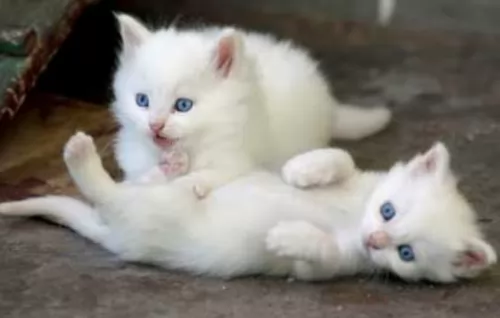 Turkish Angoras are generally healthy, but white cats with blue eyes can be prone to deafness. It is the W gene that is responsible for the white coat and blue eyes. Unfortunately, the presence of a blue eye can indicate deafness in the cat. But there are these cats that have 2 blue eyes and they have normal hearing.
Turkish Angoras are generally healthy, but white cats with blue eyes can be prone to deafness. It is the W gene that is responsible for the white coat and blue eyes. Unfortunately, the presence of a blue eye can indicate deafness in the cat. But there are these cats that have 2 blue eyes and they have normal hearing.
Another problem that has been seen in this beautiful cat breed is Ataxia which is a deadly neuromuscular disorder.
The most common sign of ataxia is an abnormal way of walking and the cat is actually unsteady on his feet. Sometimes the feet can even drag on the ground. Thankfully, screening has reduced the incidence of the disease.
Also, watch out for hypertrophic cardiomyopathy, a kind of heart disease that causes the heart muscle to enlarge.
Just remember that with a cat, diet can also play a huge role in the health of a cat. Your furry friend needs the right meaty foods with the right balance of nutrients to remain healthy and strong.
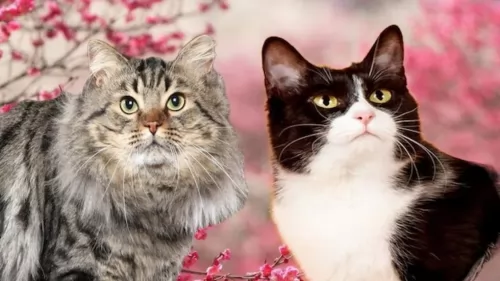 Even though the Skookum has curly hair, it’s not difficult to groom him. You want to brush the soft curls gently once a week. Keep it gentle so that you don’t make the curls frizzy.
Even though the Skookum has curly hair, it’s not difficult to groom him. You want to brush the soft curls gently once a week. Keep it gentle so that you don’t make the curls frizzy.
Use some warm water in a spray bottle with some pet conditioner and spray the curls lightly and use your fingers to liven up the curls.
Cats like to nibble throughout the day and it is better for them to feed like this as opposed to a larger meal morning and night.
However, you will need to know what your cat is eating as you don’t want to overfeed your cat. Obesity comes with a host of health issues. As a carnivore, your cat requires meaty foods so make sure to feed him high-quality cat foods that have meat and protein as the top ingredients.
Your cat must have a constant supply of fresh, cool water.
Provide your cat with a litter box. You will need to clean out the box every day of cat feces as cats don’t like to use a box that is dirty. You get special cat rakes at the vet or the pet shop that makes it easy just to rake up the feces and dispose of them.
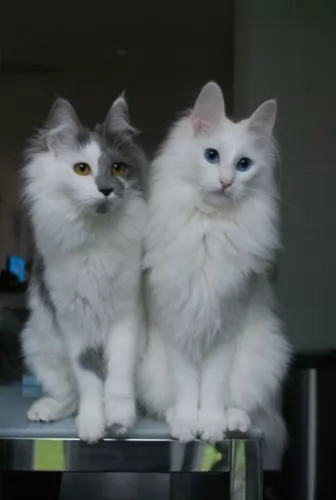 The Turkish Angora has a single coat and the lack of an undercoat makes it easy to brush him and keep the coat soft and silky. Also, the coat is only fully developed when the cat is about 2 years old.
The Turkish Angora has a single coat and the lack of an undercoat makes it easy to brush him and keep the coat soft and silky. Also, the coat is only fully developed when the cat is about 2 years old.
Check the inside of the ears. You may not want to clean them out yourself as you have to be very careful not to damage the ears. The vet and cat groomers can help you with this.
Keep your Turkish Angora’s litter box spotlessly clean. Cats are very particular about the cleanliness of their litter box and the feces will need to be removed every single day.